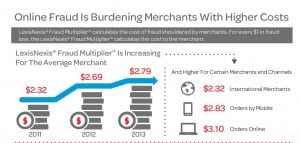
Target Confirms Unauthorized Access to Payment Card Data in U.S. Stores
Target has confirmed it is aware of unauthorized access to payment card data that may have impacted certain guests making credit and debit card purchases in its U.S. stores.

Target has confirmed it is aware of unauthorized access to payment card data that may have impacted certain guests making credit and debit card purchases in its U.S. stores.

Mobile holiday shopping has increased 80% over 2012 with nearly 20% of sales coming from mobile devices, according to a press release.A recent survey by Tripwire, Inc., found that consumers are not concerned about security as they are about convenience.

Fraud is one of the most common reasons cardholders file a chargeback. But within the category of fraud is a concept quite troubling – friendly fraud. Referred to as chargeback fraud or cyber shoplifting, this type of chargeback is difficult to detect and prevent.

As one of the most serious, but often most misunderstood, retail loss prevention issues, return fraud costs retailers billions of dollars every year.

Following the launch of Login and Pay with Amazon, consumers must remember to take caution when it comes to using login credentials across accounts. While such services may be convenient, they pose a severe cybecrime risk.

While 64% of merchants see significant increases in cyber attack activity, only 23% of attacks can be detected quickly and remediated, and nearly 70% of merchants do not take additional precautions in anticipation of increased attacks.

Amazon’s positive brand perception as a trusted and reliable ecommerce platform is sure to prompt users to select Login and Pay with Amazon as their login vehicle of choice, given the option.

Fraud is a scary thing and it is burdening merchants everyday with higher costs. According to this infographic by LexisNexis, for every $1 in fraud loss, merchants are paying $2.79. While fraud losses continue to grow, many ecommerce merchants believe fraud prevention is too expensive. It is these merchants that experience two times more in fraud losses.

A new study has found that nearly one in three victims of identity theft have chosen to avoid specific merchants after they have fallen victim to fraud. Here is a quick snap shot into how merchants are handling fraud.

How can ecommerce businesses fight the dynamic nature of fraud and reduce losses associated with fraudulent purchases? While certainly not exhaustive, here are four important things to watch for in your ecommerce fraud prevention.